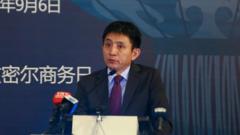In the backdrop of rising trade hostilities, China's economy faces significant pressures, and new leadership could steer negotiations towards resolution.
China's New Trade Envoy Tackles Escalating Tariff Conflict

China's New Trade Envoy Tackles Escalating Tariff Conflict
China's recent appointment of a new trade envoy signals a strategic shift amid ongoing tariff tensions with the U.S.
In a surprising move, China has appointed Li Chenggang as its new trade envoy amid escalating tariff conflicts with the United States. This decision comes as Chinese officials voice concerns over the damaging impact of what they term "tariff barriers and trade bullying" by Washington on the global economy. Li, previously an assistant commerce minister and ambassador to the WTO, replaces veteran negotiator Vice Commerce Minister Wang Shouwen. As tensions between the two nations increase, this new appointment could mark a critical juncture in trade discussions, which have grown increasingly hostile following the imposition of hefty tariffs by U.S. President Donald Trump on Chinese imports.
China's GDP figures show a growth of 5.4% from January to March, exceeding analysts' expectations but only reflecting a timeframe before tariffs escalated from 10% to 145%. With both governments publicly expressing a willingness to negotiate, progress remains stalled. Experts have mixed opinions on the implications of this abrupt shift in trade leadership; while some view it as a necessary reaction to ongoing crises, others suggest it could merely represent an ordinary change within the Chinese bureaucracy.
During an official briefing, Sheng Laiyun of the National Bureau of Statistics highlighted the strains of U.S. tariffs on China's foreign trade, yet maintained a bullish outlook on the resilience of China's economy in the long term. Meanwhile, state media criticized U.S. attitudes in trade practices, arguing that America's perception as a victim is misguided and that it has benefitted disproportionately from globalization.
Despite China's recent growth bolstered by retail sales and manufacturing, analysts warn that the true impact of U.S. tariffs is yet to be felt. The full ramifications of the trade battle will soon materialize, especially as many businesses rush to export goods ahead of tariff hikes, creating a temporary spike known as "front loading." Additionally, challenges persisting from a downturn in the property market may dampen overall economic progress, highlighting the need for China to boost domestic demand and stabilize its export sector as it navigates these tumultuous territory in international trade relations.





















